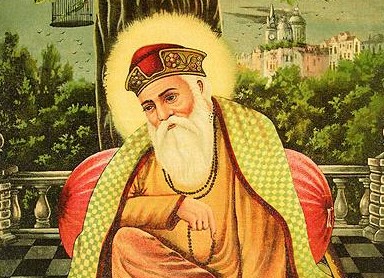
A philosophy that is universal, timeless and as true today as it was in 15th century
Date : 18/05/2024

(This is Part 1 of the series. Read Part 2)
The first Gurū of the Sikhs and the founder of the Sikh religion, Gurū Nãnak's philosophy was a spiritual concept that demanded certain social behaviour from human beings to make the world an orderly place.
His philosophy stemmed from his monotheism that there was One God and the entire universe was His creation. He envisioned peace and harmony, not for anyone sect, community or religion but the entire universe. His philosophy was, therefore, universal, timeless and as true today as it was when he delivered it in the 15th century.
Nãnak's vision of the universe was an all-embracing, all-inclusive humanism. For him, all creatures were united in being the creation of One Father-God. There was no distinction between high caste or low caste people, rich and poor or the ruler and the ruled.
Human misery
His vision was a Divine vision that was shaped by the pain and suffering he saw in the 15th and 16th-century sub-continent. Gurū Nãnak saw two societies - the Hindus and the Muslims. The former was based on Indian culture and the latter on Semitic culture. He saw societal conflict in each sphere of life.
The Muslims were divided into the upper, middle and lower class. Supported by the middle class the upper class exploited the poor by taking away the lion's share of their earnings. They lived in luxury at the cost of the poor. They unleashed atrocities on the Hindus to which Gurū Nãnak was a witness. He describes the state of affairs in a hymn:
Rulers are turned beasts of prey, their officers' hounds
None do they allow in peace to rest.
The subordinates wound the people with their claws:
Like dogs lick on the blood and marrow of the poor. (GGS p. 1288)
Gurū Nãnak decries his times:
Avarice is king; evil-doing his minister,
Falsehood his revenue factor;
Lust is the counsellor, always consulted for advice.
The subjects are purblind and thoughtless-
Wretches who are like stuffed carcasses. (GGS p. 468)
There were evils in the Hindu society too. The caste system treated a large mass of people as sub-human whose very touch could pollute. This was unacceptable to him and he expressed strong disapproval of the same:
Caste and dynastic pride are condemnable notions;
The One Master shelters all existence.
Anyone arrogating superiority to himself shall be disillusioned.
Saith Nãnak: Superiority shall be determined by God,
crediting such a one with honour. (GGS p. 83)
Destructive divisions in society between man and man, man and religion, ruler and the ruled, intellectual superiority and enforced lowliness, between the feeling of entitlement and deprivation, which were responsible for societal and religious conflicts in Gurū Nãnak's time. He has expressed deep anguish at the prevailing state of affairs in society through the imagery of a dark night:
The age is turned knife, rulers butchers wielding it;
Righteousness on wings has flown away.
In the dark night of evil, the moon of truth is nowhere visible.
I have sought for distraction:
No path is visible in the darkness. (GGS p. 145)
Nãnak saw such injustice in society as untruthful living. He saw the universe as the dwelling place of God, that One Reality called Truth. In his vision God was love. Any society that was the cause of so much hatred and human misery had moved away from the Truth, that is God.
Universal message
Gurū Nãnak provided an alternative philosophy for society with one universal message: to love God and His creation. It was meant to provide a firm foundation for a happy and harmonious living globally.
Nãnak felt a dire need to hold the society in a sound state of health. He wanted social harmony to replace social rivalry. So he sought to instill universal transcendent values in mankind to make this world a better place to live in for everyone. In his vision inequity of any kind leads to divisions and social tensions in society. Since the natural divine order demanded that God's entire creation must live in harmony there was a moral obligation on people to fashion the world according to His Divine Will.
Nãnak thus made God a spiritual concept and evolved principles of social behaviour on this concept. He advocated the conduct of people based on moral values for a fair and just society.
Ethics are central to his belief system. Nãnak held truth very high but truthful living was rated the highest.
...Realization of Truth is higher than all else-
Higher still is truthful living.
All creatures are noble, none low.
One sole Maker has all vessels fashioned;
In all three worlds is manifest the same light... (GGS p. 62)
Encroachment on other people's rights was considered evil and forbidden because what mattered in his vision of the Divine order, and he underscored this time and again, was the purity of mind and sincerity of purpose.
To achieve harmony in the Universe, Nãnak said mankind needs to cultivate five virtues: Truth, Love, Compassion, Humility, and Contentment, and eschew five evils: Lust, Anger, Attachment, Greed and Pride.
(Picture Credit: Cropped image of Raja Ravi Varma's Guru Nanak Dev from Wikimedia Commons)
Tags :
Note: Your email address will not be displayed with the comment.